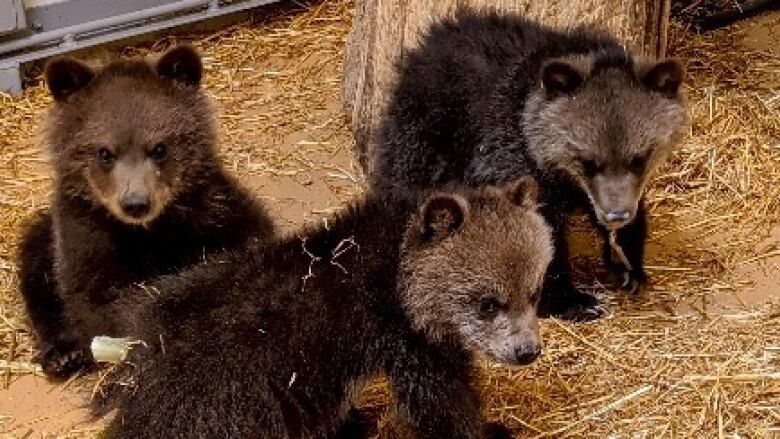Send orphaned grizzly cubs back into wild, 73 bear advocates tell province in open letter
Calgary Zoo caring for 3 cubs since mother killed by hunter

A group of scientists and animal advocates wants the Alberta government to rehabilitate three orphaned grizzly cubs rather than allow them to be sent to zoos.
In an open letter to the government, the group expresses concerns about the cubs, whose mother was shot by a hunter in southwestern Alberta earlier this month.
"Our group respectfully requests that Alberta Fish and Wildlife consider rehabilitating and releasing these cubs into the Alberta wilderness to boost the province's grizzly bear population rather than condemning these bears to long-term captive care," says the letter.
It was signed by 73 scientists, educators and conservationists from Alberta, British Columbia and outside Canada.
The young bruins are being cared for at the Calgary Zoo. Advocates say zoo officials intend to seek permanent homes for the cubs at other facilities across North America.
The letter says Alberta is ignoring its grizzly population.
It says grizzlies have been a threatened species in the province since 2010, and rehabilitation and release into the wild is the most humane solution for the cubs.
The group says the bears should be sent to the Northern Lights Wildlife Shelter in Smithers, B.C., which it says has successfully raised and released 25 grizzly cubs since 2007.
"Once successfully reared and capable of surviving in the wild on their own, the cubs would be released back into an appropriate area with as little human development as possible," the letter says.
"Our group believes that rehabilitating these three orphaned cubs is a critical first step in revamping Alberta's commitment to grizzly bear conservation and recovery."
Grizzly bear specialist Reno Sommerhalder, one of the letter's signatories, told CBC News that he believes the cubs still have a good chance of surviving as wild animals.
"At this age, when they are spring cubs, they are still little fur bundles, basically, They can still be bent, and I am pretty sure that they have a very very good chance of a life in the wild," he said.
But the province says evidence about the success of grizzly rehabilitation or the safety risks associated with it is inconclusive.
"To our knowledge, no other jurisdiction in North America currently allows grizzly rehabilitation. Grizzlies are different than black bears because they often stay longer with their mothers, meaning they take longer to learn the ropes in terms of foraging and hunting," said Alberta Environment and Parks spokesperson John Muir.
"This means they need to be in rehabilitation longer than black bears in order to survive in the wild. This causes safety concerns because the longer a bear is in rehabilitation, the higher the risk of habituation and aggression when the bear is released."
The group of bear advocates is urging Alberta to update a draft 2016 recovery plan for Alberta's grizzly population, noting the last plan covering habitat security and other bear protection issues expired seven years ago.
When it announced earlier this month that it was caring for the cubs, the Calgary Zoo said the bears would not have survived without human intervention.
"We strongly believe that science and animal welfare best practices support these orphaned grizzly cubs going to an appropriate zoo," said the zoo in reply to a comment on Facebook suggesting the bears be returned to the wild.
With files from CBC Calgary